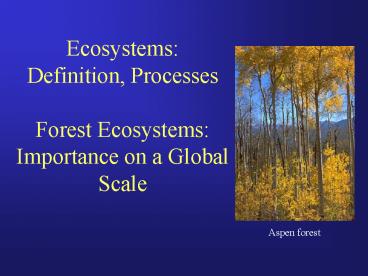Ecosystems: Definition, Processes Forest Ecosystems: Importance on a Global Scale - PowerPoint PPT Presentation
1 / 23
Title:
Ecosystems: Definition, Processes Forest Ecosystems: Importance on a Global Scale
Description:
Definition of Ecosystem ... no inherent definition. of spatial dimension. Gallatin ... Forest provide wood, food, habitat, fuel, pharmaceuticals, recreation ... – PowerPoint PPT presentation
Number of Views:208
Avg rating:3.0/5.0
Title: Ecosystems: Definition, Processes Forest Ecosystems: Importance on a Global Scale
1
EcosystemsDefinition, ProcessesForest
Ecosystems Importance on a Global Scale
- Aspen forest
2
Definition of Ecosystem
- An ecosystem is a community of interacting
species, taken together with the physical
environment within which it exists and with which
the species composing the community also
interact (Perry 1994)
Tongass National Forest Alaska
3
Definition of Ecosystem
- A conceptual unit comprised of organisms
interacting with each other and their
environment, having the major attributes of - structure
- function
- complexity
- interaction
- interdependency
- temporal change
- no inherent definition of spatial dimension
Gallatin National Forest Mountain Pine Beetle
4
Ecosystems
- Individual organisms or species generally are not
able to perform all of the functions that are
needed to sustain life - They tend to group together into communities in
which they interact with each other and their
environment
5
Forest watershed - A large and complex ecosystem
6
Why study forest ecosystems?
- Forest provide wood, food, habitat, fuel,
pharmaceuticals, recreation - Forests affect the movement and transformation of
water, energy and nutrients
Roosevelt ElkOlympic National Park
7
Why study forest ecosystems?
- Trees capture and store more carbon than any
other type of plant
Rogue River National Forest, Oregon
8
Why study forest ecosystems? Global heat balance
- Forests account for approximately 70 of the
Earths leaf surface area - In relatively moist environments, forests support
from 2 to 10 times more leaf area per unit of
land than do grasslands
George Washington National Forest, Virginia
9
Why study forest ecosystems?Global heat balance
- Leaves absorb a much higher proportion of the
suns energy than does bare ground - Forests absorb 75-93 of incident solar energy,
a higher proportion than other vegetation type. - Only about 2 of this energy is used in
photosynthesis most of the energy is used to
evaporate water, which is then moved around the
globe.
Rainforest
10
Why study forest ecosystems?
- Forests therefore greatly affect the Earths heat
balance, hydrologic cycles and climate
Ross Creek Western Redcedar GroveWestern Montana
11
Why study forest ecosystems? Hydrologic cycle
- Forests account for the majority of
evapotranspiration from land and thereby affect
rainfall patterns on land - Leaves transpire water back to the atmosphere
- Leaves provide surfaces on which water vapor
condenses and therefore returns to the earth - Trees enhance the water-storage capacity of
soils, thereby preventing floods and erosion
12
Forest Ecosystem Management
- Forest ecosystem management involves the use of
an ecological approach to forest resource
management - at the landscape level
- that blends biological, physical, social, and
economic processes - to ensure the sustainability of healthy forest
ecosystems - while providing desired values, goods and
services to society
13
Managing ecosystems requires knowledge of
- Physical properties
Biological organisms
Functional processes
14
Basic concepts in ecosystem management
- 1. Sustainability Sustainability refers to
resiliency of ecosystems their capacity to
recover from disturbance and the rate at which
they restore ecological processes to a
pre-disturbance condition - Ecosystems are sustainable if we understand their
dynamics and manage them skillfully - When a forest is managed for sustainability, it
retains productivity, diversity and overall
integrity in the long run.
Loxahatchee River Florida
15
Basic concepts in ecosystem management
- Goals of ecosystem management that may be
sustainable are - Maintaining a mix of ecosystem goods, functions
and conditions that society wants - Maintaining evolutionary and ecological processes
- Maintaining viable populations of native and
non-native species
Rogue River N.F.Oregon
16
Basic concepts in ecosystem management
- Change
- Ecosystems change whether they are managed or not
- Ecosystems are both dynamic and resilient
- Disturbance elicits response - both are natural
to ecosystem function
Mt. St. Helens scorched forest
Mountain Pine Beetle kill
Mt. St. Helens before and after blast
17
(No Transcript)
18
(No Transcript)
19
Basic concepts in ecosystem management
- 3. Ecosystems are complex
- They vary in size
- There are linkages among parts
- They include biological and physical diversity
- Many processes are involved
- They can be studied on different scales
Willamette N.F.
20
Basic concepts in ecosystem management
- 4. Ecosystems have biophysical, economic and
social limits - Society wants goods and services
- Ecosystems can provide only a limited amount of
these before they begin to deteriorate - Understanding the limits of an ecosystem helps us
to make wise management choices - Understanding the potential of an ecosystem helps
us to manage to provide broader array of choices
Soil Erosion
21
Basic concepts in ecosystem management
- 5. Ecosystems are not fully predictable
- Even the best models are still only
approximations based on a variety of assumptions
Flooding caused by beaver dam
22
High elevation spruce-fir forest in north Idaho
Ecosystem Management ONE SIZE DOES NOT FIT ALL
Lodgepole pine 18,000 stems per acre
300 year-old ponderosa pine - Oregon
23
Photo Credits
- Thinkquest.org
- Americanlands.org
- www.uwsp.edu/Geography 101
- ForestryImages.org
- Photo-guide.com
- www.bugwood.org

